Pledge 1%’s #WomenWhoLead series celebrates female leaders who are paving the way for the next generation. While our featured leaders come from a variety of backgrounds and industries, they are united in their efforts to promote equality for all women in the workplace. We’ve asked them to share a bit about their journey to success, as well as lessons they’ve learned along the way.
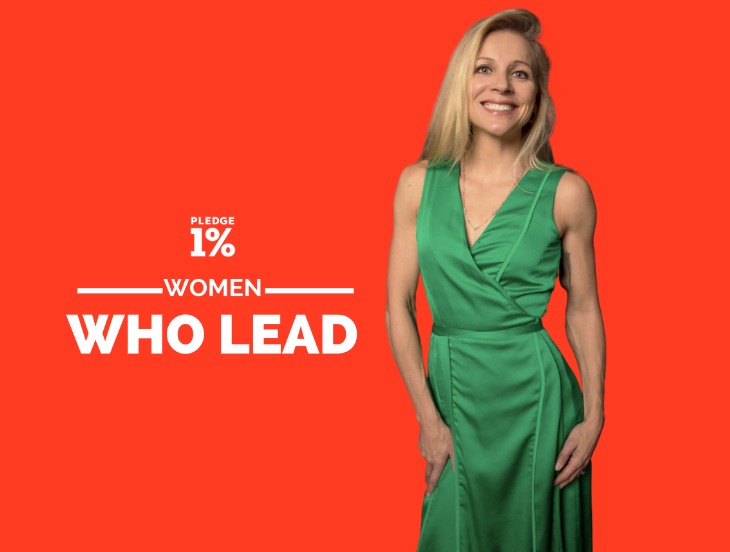
Sara Stender Delaney
Founding CEO, Sarilla
Asheville, NC USA
What is your current role? Briefly describe in 1-2 sentences.
I lead our company’s brand development, community partnerships and Ask for Sarilla campaign. I invest in our farmer partnerships and help to create a new paradigm of conscious commerce.
What’s the best part of your job? What do you enjoy the most?
I love team building, and sharing time with people who really get what we are doing.
We’ve all faced personal and professional challenges these past two years – what motivates you to keep going?
My purpose for being overpowers the challenges I face on a daily basis. I almost lost my life in my early twenties and it was a wake up call, so since then I have learned healthy coping tools to manage stress, social anxiety, and overwhelm. My time in Rwanda taught me that we are never alone, that someone else is going through what we are feeling too, and that it is really hard to heal in isolation. The importance of having a community support network is the topic of my last Ted Talk.
What’s the best piece of advice you ever received?
Move a muscle, move a thought.
What does generosity mean to you?
Being kind to ourselves and bringing warm energy to a room. Offering time to someone in need. Holding the mindset that there is plenty to go around and to be free with information and resources.
How do you feel businesses can play a larger role in solving today’s biggest challenges? Do you have any specific stories or examples from your work or colleagues you can share?
The big issues we are tackling include mental health, gender-based violence, poverty, climate change. It can be hard to focus on one thing since there are so many needs today, but our impact is greater when we do focus on what we know and which areas we can really effect change. For me that is ending sexual violence. We are tacking this with the Ask for Sarilla campaign, becoming the go-to alcohol-free social drink, and partnering with community organizations that help prevent alcohol-induced violence and assist women who have a history of trauma. We must look at the root cause of problems, and I believe that social enterprises are the future in terms of global change.
If you could describe yourself in one word what would that be and why?
Resilient. I have overcome some experiences that others might say is their worst nightmare. I took it one step at a time and had help along the way. I have learned that it is important to share my story because it may help someone else, and today it is my mission to show others that no matter what you were born into, there are no excuses for staying stuck in a life that does not inspire you.
If you could pick a song to guide you through 2022, which song would it be?
What are you looking forward to this year? Are there any goals (personal or professional), activities, or experiences you are excited about?
I’m excited to travel back to Rwanda soon! I always get new inspiration and a sense of fullness when I spend time there and I miss the people. This year we are launching into a new channel and with a new brand look so I can’t wait to unveil that when the time is right.
Is there anything else you’d like to share?
Sarilla is currently accepting interest from social impact investors. Please contact me if you would like to review our deck.
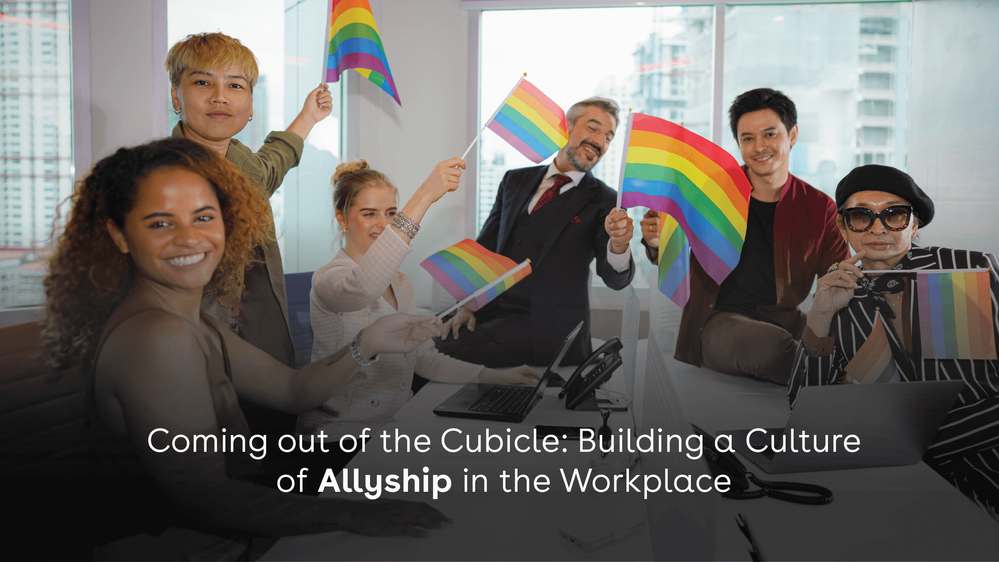
Submitted by Goodera
We all know that being your authentic self is the only way to flourish and thrive in today’s world. Now imagine if you couldn’t. Not because you wanted to and didn’t know how, but because you were forced to do so. What if you had to add an extra layer to your life every time you went to work? What if you had to pretend to be someone else just to eat lunch in the cafeteria? What if you had to keep part of yourself hidden while meeting a client? How would you feel?
This is the ground reality across corporate America, where 40% of LGBTQ+ workers haven’t come out at work. Among out at work, 54% hide the fact from clients and customers, trading the closet at home for the cubicle at work. If the ‘New Normal’ has to live up to its reputation as the new era of fairness, equity and justice, we must create a more contemporary culture of LGBTQ+ inclusion.
An actionable plan for a more inclusive LGBTQ+ workplace culture can be whittled down to three basic tenets: empathy, understanding, and engagement. While these aren’t radical new approaches, their implementation is what sets them apart. The time for half measures and big promises eschewing affirmative action has passed. Instead, it is time to be bold, equitable, and proactive in our approach to LGBTQ+ D, E & I at the workplace.
- Let’s take a look at Empathy first.
To be more empathetic, we must understand that empathy and sympathy aren’t mutually interchangeable. In the corporate context, this translates to reviewing and creating new policies for LGBTQ+ individuals, especially if they are women, BIPOC, Latino, persons with disabilities, and/or AAPI.
For example, LGBTQ+ women comprise 2.3 percent of entry-level employees yet comprise only 1.6 percent of managers and even smaller shares in leadership positions. In such cases, LGBTQ+ inclusion cannot come at the cost of gender parity. So while we work to include one group, we mustn’t inadvertently exclude another.
Showing empathy also involves starting a dialogue that makes employees aware and sensitized to topics that affect the LGBTQ+ community that cis-gender and non-LGBTQ+ employees sometimes take for granted. Again, pronouns are a great place to start.
Using the appropriate pronouns such as they/them/theirs, she/her/hers, he/him/his, or even zie/zir/zirs across internal and external modes of communication can let LGBTQ+ and non-binary employees feel seen. Given the generational shift among the workforce that skews towards pronoun-conscious millennials and Gen-Z, this small step goes a long way towards building purpose and loyalty among new employees.
- You need to follow up empathy with Understanding.
Even among the LGBTQ+ community, queer and trans folx are some of the most misunderstood. According to a survey on global attitudes toward transgender people conducted in 16 countries, 30% of respondents worried about exposing children to transgender people. In addition, only 40% would use the correct pronouns when addressing them. With misconceptions and misunderstandings, inclusion will always be an uphill battle unless organizations encourage understanding and start a conversation among the ranks.
One way to achieve this is by investing in programs—such as affinity groups, LGBTQ+ networks, paid internships, or formal mentorship opportunities—aimed at LGBTQ+ employees. Even then, these conversations shouldn’t be confined only to Pride Month or LGBTQ+ History month; actual progress means inclusion, empathy, and understanding for every letter of the abbreviation 365 days a year. That is where engagement comes in.
- Using employee engagement to amplify understanding
More than 60 percent of LGBTQ+ respondents to a global survey reported needing to correct colleagues’ assumptions about their personal lives. Engagement, primarily through volunteering, can bring these conversations to the forefront in a safe space free of judgment. It also let’s new hires know that they have entered a culture of acceptance and tolerance, which can create a strong emotional anchor for retention and loyalty.
Goodera and its non-profit partners have created a host of meaningful activities supporting the LGBTQ+ community during Pride Month 2022 as part of our #ShowSomeLove campaign. These opportunities cover in-person, hybrid, and virtual activities that teams of employees or ERGs can undertake to support local and global LGBTQ+ communities.
The benefits of a new culture of LGBTQ+ D, E & I speak for themselves…
In his book, ‘The Economic Case for LGBT Inclusion, economist and author M.V. Lee Badgett says that business hostility toward the LGBT community costs countries up to 1 percent or more of their GDP. So, of course, we cannot argue the economic sense of letting employees be their authentic selves at work but a culture of LGBTQ+ inclusion also comes with a few salient benefits.
- For starters, it fosters creativity as diverse teams show higher productivity, higher creativity, lesser groupthink, and even higher innovation potential than teams consisting of people with similar backgrounds.
- Diversity and Inclusion can open up business opportunities as organizations that employ LGBTQ+ employees will have an inherent advantage when designing products and services to cater to their niche needs.
- Diversity creates an environment conducive to networking. These networks eventually translate into an inclusive work culture and not just a diverse one.
Building empathy for LGBTQ+ employees, understanding them, and engaging the workforce to include them is no longer a metric of vanity but one of success. Research has shown that teams with greater diversity and inclusion experienced a 14.4 percent gain even when the S&P 500 saw a 35.5 percent decline in stock performance. So what would you rather have employees focus on in our increasingly volatile, uncertain, complex, and ambiguous world? Bringing out their best or hiding their authentic self? The answer to this question will determine our successes or failures in the new normal.
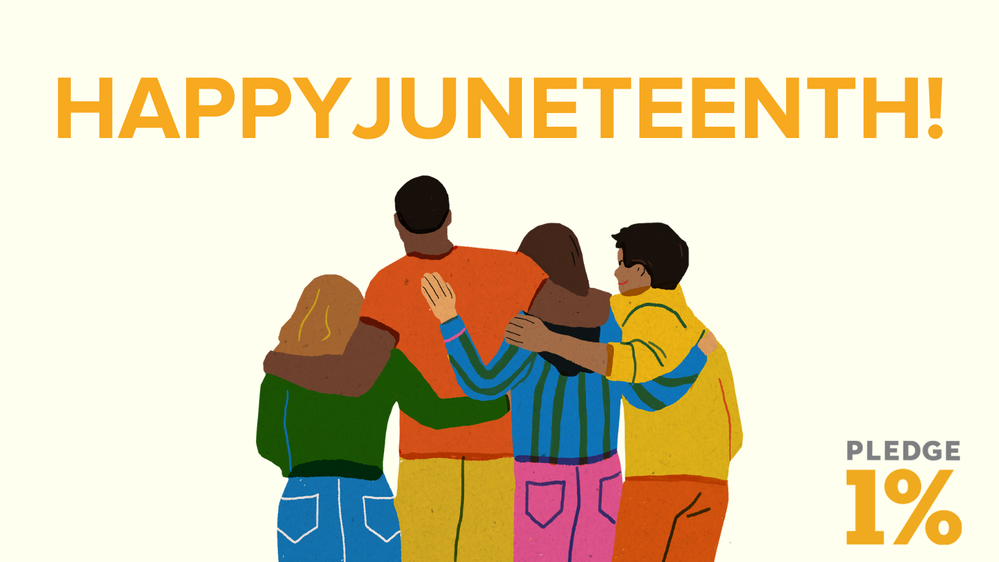
Happy Juneteenth!
Today, we celebrate this day of freedom and commemorate those who fight against racial injustice. While it’s important to recognize and help explain the importance of Juneteenth, we also know this isn’t a one-day event; it’s a reminder of a daily effort we all must make to build a more equal and inclusive world. As many of us observe this historic holiday, we want to ask our Community:
What can we do in our workplaces to meaningfully commemorate Juneteenth?
Over the past 19 days, we’ve been sharing tips, examples from Pledge 1% members, and resources on our social media. You can browse the full curated a list below, along with some actions companies can take to honor this day throughout the year:
- Last year marked the first celebration of Juneteenth as a Federal Holiday, but it was a long and arduous fight to achieve that recognition. Understanding the history of our youngest holiday is an important first step to commemorating it. This article by the New York Times breaks down the timeline from state celebration to Federal holiday.
- Working virtually has helped Black employees avoid microaggressions in the workplace. As companies return to in-person work, going back into the office has become a key topic in workplace inclusivity. PBS shares tips on transitioning back to the office.
- Investing and supporting Black-owned companies can help diversify both your company’s portfolio and Black entrepreneurs. This Mashable article covers how to find and support black business through investing.
- Do you have a Black employee resource group? Amplifying black voices in your workplace is a key way to engage and provide essential community spaces. Find examples like Salesforce’s BOLDforce to learn why employee resource groups are important and powerful.
- Being an authentic ally is a key way to dismantle structural racism and sexism in the workplace. According to the 2021 Women in the Workplace report “How gender and race inform the workplace” by McKinsey, Black women are more than 1.5x more likely to say they don’t have allies in their workplace.
- Corporations play a huge part in shaping societal values. By honoring Juneteenth, you encourage conversations around resources and advocacy needed to support Black employees. This article by Forbes provides actionable steps to dismantle racism in the workplace.
- A key way corporations can support Black employees is to make Juneteenth a paid holiday. Pledge 1% builders like Twilio and Yelp have already taken the initiative to build PTO for Juneteenth into their company culture. This article details why this step is important not only for corporate culture, but also for the broader community in general.
Are you celebrating Juneteenth? If you find these resources helpful, or would like to share your own, we would love to hear from you. Please post them in our Social Impact Forum or in the comments below.
Three Starting Points To Effective Social Impact

Originally posted on Forbes.com
The last few years have taught us some powerful lessons and made us realize just how connected our world has become. Importantly, we have seen that despite the very real hardships in the world, there is also an immense amount of good, with people working together in small and large ways toward bettering our society. Such events have led to the higher prioritization of corporate social responsibility (CSR) initiatives and made CEOs and leaders take a closer look at how they are managing their teams, business and philanthropy.
At DigitalOcean, we have always held “Love is at Our Core” as an intrinsic value. It was with love that our first official social impact program was launched in 2018, Hub for Good. Last year, at our IPO, we announced that we’d change the name to Hollie’s Hub for Good to honor a beloved employee who suddenly passed away just before we went public. We also joined the Pledge 1% movement, committing to spend at least $50 million over the next 10 years to build DO Impact, our social impact platform.
I believe in managing a business to optimize outcomes for customers, employees and investors, and it’s also my belief that an important element is to also address the communities our core constituencies are a part of. As a derivative, we also have to be mindful of their communities as a lever to drive this optimization. It’s Ben Franklin’s concept of “doing well by doing good.” The two are not mutually exclusive and work best when they are both aligned with the company’s mission.
Give The Initiative The Respect It Deserves
We owe it to employees and communities to do more to engage and to leverage our talent and our assets to help the communities in which we live and the customers we serve.
Corporate social impact must be given its place as a fundamental business unit. Whether that means a full department, a part-time role or a committee of employees, it must have an organizational structure with goals, budget and accountability.
Any official program will need a champion and leader to activate and empower initiatives targeted to have a broader social impact. This may not be at a vice president or C-level, but ultimately there needs to be a person leading the charge.
Like any other internal organization, a social impact team must be held responsible for the outcomes of its program. The initiative and the people who have made CSR their career path are owed the respect of that kind of responsibility.
Find Ways To Be A Force Multiplier
An effective social impact program must look beyond its office walls to have a significant impact. Particularly for companies in technology, their greatest assets tend to be the technology they create, the customers they serve and the people they employ. Use these assets to be a force multiplier and exponentially increase your impact.
Gartner this year released a study that revealed 56% of respondents stated that the pandemic made them want to contribute more to society. Employees want to contribute something good to the world, and business leaders should be looking at that as an opportunity to harness. Arm your employees and customers with products and resources to be the force for change, and they will do it willingly.
In addition to committing capital and matching employee donations on a regular basis, take it a step further by encouraging and sponsoring them to donate time and expertise to nonprofits and NGOs. This effort supports our community with valuable knowledge, but it also supports employees’ desire to be change-makers and adds additional meaning to their lives and livelihoods.
Hold Yourself And The Company Accountable
Measuring performance is essential—and it’s vital to hold yourself, your company and the team leading the charge accountable for the results. Like any other area of a business, a social impact program’s effectiveness will rise and fall, and like any business unit, you will have to adjust and evaluate regularly. That’s OK!
Last year, we released the findings of our first DEI (diversity, equity and inclusion) report. I’ll be honest—the baseline report showed we had a lot of work to do to match the perspectives and experiences of our global customer base. But now we have a starting point. This kind of transparency is essential to make the changes needed in our recruiting and retention efforts, and we have KPIs and metrics in place.
We are accountable to deliver on our DEI goals, as well as our impact goals. I believe it is integral to our business strategy to deliver great outcomes for our core customer, employee and investor constituencies. The community is bigger than just us; this is something we can all learn.
Justworks to Award $250,000 in High-Impact Grants to Non-Profits Working to Break Down Barriers to Entrepreneurship
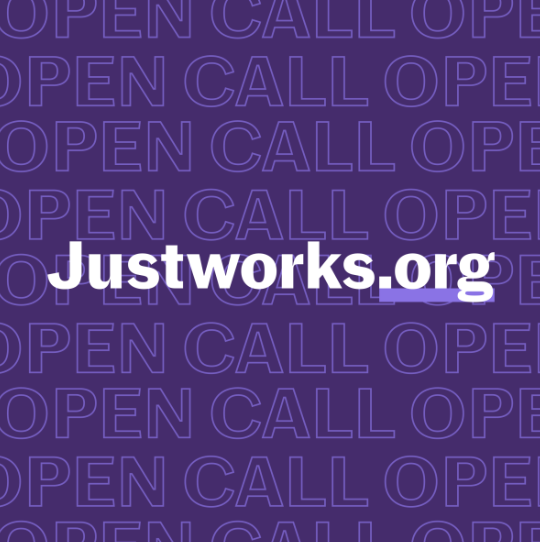
Justworks, the HR software platform for small businesses, today announced it is planning to award $250,000 in high-impact grants to five non-profit organizations supporting underrepresented founders in getting their businesses off the ground. Last year, Justworks pledged to donate 1% of the company’s equity and profits to create more equitable access to entrepreneurship through Justworks.org—joining other influential tech companies in the Pledge 1% movement, which inspires, educates, and empowers every entrepreneur, company, and employee to be a force for good. This first tranche of grantmaking is Justworks’ first foray into its 1% pledge.
About the Grant Program
For nearly a decade, Justworks has worked to make starting and running a business in America more accessible for all through its all-in-one software platform, which provides founders and their teams with access to benefits, payroll, HR, and compliance support.
However, many entrepreneurs also face unfair barriers to their success. Disparities in opportunity along race, gender, sexual orientation, and other socioeconomic lines, for example, can make access to funding, resources, and other fundamentals of entrepreneurship a major obstacle for underrepresented founders in realizing their potential.
Through $50,000 grants to five existing non-profits that support underrepresented founders in accessing the fundamentals of entrepreneurship, Justworks.org aims to increase the company’s impact in the minority- and women-owned business (MWBE) community, learn from organizations already having a positive impact in the space, and chart a course to scale its social impact moving forward.
“Justworks is lucky to have many amazing minority- and women-owned businesses (MWBEs) on our platform today. Our customers have taken on perhaps the biggest challenge in their lifetime and are looking for a partner they can trust,” said Yrthya Dinzey-Flores, Vice President of DEI, Social Impact, and Sustainability at Justworks. “We are proud to be a part of their story, but we also recognize that underrepresented founders face unique challenges beyond our platform. While we don’t have all the answers, we believe our close relationship with them—through our software and our service—puts us in a unique position to co-create solutions with organizations that are already active in supporting the MWBE community.”
How Nonprofits can Apply
After a month-long submission period, five U.S.-based 501(c)(3) non-profit organizations will be selected to receive a grant of $50,000 to support their existing work with underrepresented founders. The call for proposals will remain open from Tuesday, May 3, 2022 to Friday, May 27, 2022. Interested non-profit organizations can learn more and apply for a grant here.
In addition to providing them with financial support to realize their mission, Justworks aims to develop long-term relationships with organizations that know the MWBE ecosystem better than anyone. Justworks.org builds on several of Justworks’ existing initiatives aimed at supporting its non-profit customers, like the Spring Forward Fund, as well as its work to make its platform more accessible for its MWBE customers through its Just Thrive program.
About Justworks
Justworks is a cloud-based software platform that gives small and medium-sized businesses access to benefits, payroll, human resources and compliance support—all in one place. We drive economies of scale via co-employment, enabling attractive cost savings for our customers, and providing them a richer suite of benefits for their employees. We believe we are the first provider to combine this powerful demand aggregation dynamic with a simple, intuitive user experience and 24/7 expert support—enabling entrepreneurs and businesses to grow with confidence. To learn more, visit Justworks.com, follow us on Twitter @Justworks and Instagram @Justworks_HR.

Pledge 1%, a force multiplier and global movement to inspire, educate, and empower every entrepreneur, company, and employee to be a force for good, today announces that a growing number of top venture capitalists (VCs) featured on the Forbes Midas List have personally agreed to support the movement, proving the most successful VCs are increasingly taking the time to ensure the companies they influence also have a positive ESG impact on the world:
- More than 20 percent of the VCs on this year’s Midas List were on the board of a company that set aside equity to fuel long term social impact efforts. At the time the 2020 list was published just two years ago, that number was approximately 13 percent.
- That number jumps to 35 percent if individuals who were the lead investor from their firm supporting these companies are included, up from about 17 percent at the time the 2020 list was published.
“While the Pledge 1% movement was founded six years ago, partnering with companies to set aside equity for social impact on the path to IPO is something we’ve been fueling with greater intention and focus over the past two years. The impact can be seen not only on this list, but in the huge amount of corporate philanthropy we’ve been able to unlock together,” said Amy Lesnick, Chief Executive and President of Pledge 1%. “We’re incredibly proud of the impact these VCs and their portfolio companies are having. With their support, we’re paving the way for a future state where setting aside assets for ESG and philanthropy will be ingrained in every organization’s DNA.”
Globally, there’s a huge push towards ESG and a more inclusive, engaged business culture. Companies are increasingly having to figure out how to incorporate social impact into their business, especially as it continues to play an important role in talent recruitment, retention, and engagement strategies. With the help of Pledge 1%, the Pledge 1% Boardroom Allies, and their portfolio companies – like AvidXChange, Coinbase, Sprinklr, and UiPath – billions of dollars have been ignited through their equity pledges to fund corporate philanthropy.
Today’s momentum builds on Pledge 1%’s announcement last fall that over $2 billion in new philanthropy has been unlocked for good since the launch of its CEO Equity Playbook in the summer of 2020.
About Pledge 1%: Pledge 1% is a force multiplier and global movement to inspire, educate, and empower every entrepreneur, company, and employee to be a force for good. Over 15,000 members in 100 countries around the world have used Pledge 1%’s flexible framework to ignite billions of dollars and hundreds of thousands of volunteer hours in new philanthropy. To learn more about Pledge 1%, and how your company can get involved, visit pledge1percent.org.
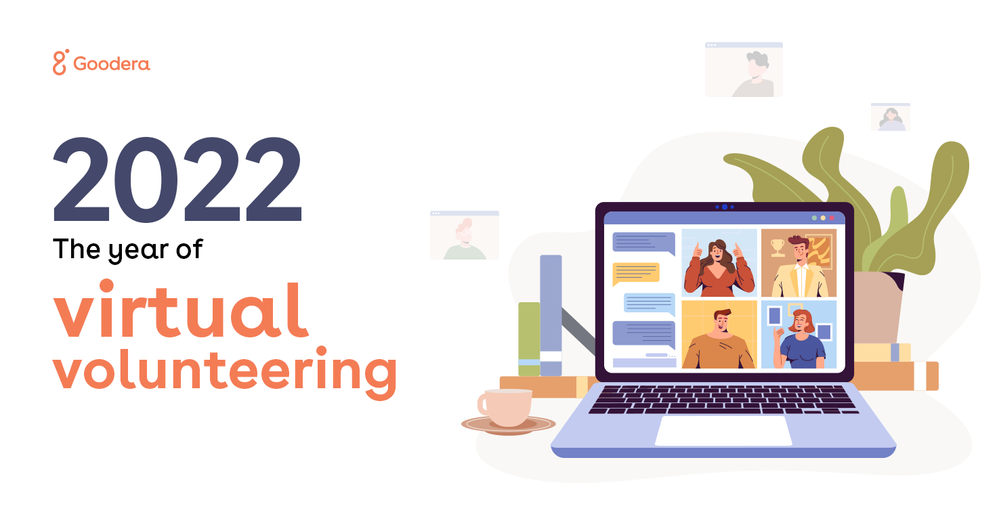
2022 – The Year Virtual Volunteering Gains Greater Prominence
Corporate giving witnessed a leap in its evolution in 2020. The pandemic led to a period of corporate and personal introspection, resulting in greater empathy, more understanding, and a positive bias for action. Virtual volunteering was at the forefront of this paradigm shift. It adhered to lockdowns and social distancing norms, allowing employee engagement.
Virtual volunteering started small in 2020 and, by 2021, turned into a way for 52% of companies to support the causes in which they believe. In keeping with this upward trend, 2022 could be the year virtual volunteering gains further prominence.
Before delving into the ‘hows,’ we must first understand the critical factors behind virtual volunteering’s growth over 2020 and 2021:
- Virtual volunteering offered organizations and individuals the ability to support the causes they believe in without the additional logistics, planning, and scheduling involved in physical volunteering.
- Because virtual volunteering was a remote activity, it provided safety for volunteers at the height of the pandemic.
- Virtual volunteering gave organizations a way to measure and track engagement metrics and give more effectively and accurately.
- Virtual volunteering allowed organizations to support a range of causes and nonprofits worldwide.
- Organizations saved 33% more money using virtual volunteering than with similar physical volunteering activities.
These factors made it easy for organizations to transition from physical models of employee giving to virtual volunteering. In addition, 91.3% of organizations currently using virtual volunteering said they were most likely to continue these activities in the future.
This statistic alone makes a great case for virtual volunteering’s high adoption rate in 2022. But it’s not the only one. So let us examine a few more reasons 2022 will be the year virtual volunteering gathers more significant momentum.
1. COVID-19 is evolving, and so are working models
While levels of infection have dropped and recovery rates have improved, the fact is that there are still new strains and mutations of the virus emerging.
To cope with this ebb and surge, organizations have adopted hybrid and permanently remote models of working. Virtual volunteering offers a common platform to these organizations to continue employee giving initiatives despite any impending lockdowns.
2. Consumer consciousness is growing.
As confirmed by the Edelman Trust Barometer, social responsibility has become an index of a brand or organization’s goodness that influences buyer behavior. Virtual volunteering offers organizations an avenue to augment or improve their social currency.
3. Employee purpose is evolving.
Projections show that millennials will form 75% of the global workforce by 2025, studies
show.
The same study also states that 71% of them think business can do much more to address society’s challenges in the areas of most concern: resource scarcity (56%), climate change (55%), and income equality (49%). These happen to be some of the critical initiatives covered by virtual volunteering.
4. Corporates are leveraging virtual volunteering for employee engagement and retention.
A global talent trends survey found that the highest-performing employees are 3x more likely to work for a company with a strong sense of purpose.
Younger workers are searching for impact-driven companies that champion the journey towards building a better world and take steps to effect positive change. Virtual volunteering has become a way for organizations to engage employees and attract new talent through the alignment of purpose.
5. The rise of micro-volunteering
Micro-volunteering activities are virtual actions that take only 10-30 minutes. They allow employees to partake in volunteering activities as organizations look to ramp up productivity to make up for the effects of the pandemic.
Micro-volunteering tasks can be performed at someone’s desk during lunch or a cab ride and do not have intensive material or training requirements. Apps such as the Karma app, developed by Goodera and Zoom, also facilitate these actions between virtual meetings.
In Conclusion
The pieces that will drive increased adoption of virtual volunteering are already in place. What will tie them together is that our world is in a state of flux. There are emerging crises, catastrophes, and causes to which we are all beginning to pay greater attention.
There is also an increased awareness among corporates that it is time to act. Again, virtual volunteering is helping to bridge the gap between those who need help and those willing to provide it.
If you’re looking to get started with virtual volunteering, a great place to begin would be Goodera’s Karma Hub – the world’s largest repository of virtual volunteering opportunities. Goodera has partnerships with 50,000+ non-profit organizations and has conducted volunteering sessions for 300+ companies.
Pledge 1%’s #WomenWhoLead series celebrates female leaders who are paving the way for the next generation. While our featured leaders come from a variety of backgrounds and industries, they are united in their efforts to promote equality for all women in the workplace. We’ve asked them to share a bit about their journey to success, as well as lessons they’ve learned along the way.

Celia Geering
Head of Sales Europe, rready AG
Zürich, Switzerland
What is your current role? Briefly describe in 1-2 sentences.
As Head of Sales Europe I lead a high-power sales team of four, growing every other month, soon to be seven. Apart from that, I’m still in sales myself covering the German market. My role is about motivating, coaching and making sure everyone can perform on their top!
What’s the best part of your job? What do you enjoy the most?
Well generally, getting up every morning full power ahead empowering all employees in corporations to fulfill their entrepreneurial mindset.
It is also the rready hands on “Born rready” mindset I love, which customers enjoy and find special about us.
Within rready, I love each interaction I have with my colleagues and the team, because they can range from hilarious to sad, to bitter-sweet, angry to loving and happy – and I love each and every moment of it.
We’ve all faced personal and professional challenges these past two years – what motivates you to keep going?
Jumping onto every opportunity that is offered to me. If you can’t stop thinking about it and start making up excuses for why you can’t accept it – That’s the moment to go for it, full speed! So I transferred that into the possibilities we had during the pandemic: I got stuck in Zürich, started my job at rready, moved into a house with five people, made my way to Head of Sales Europe – So, yes I could still go on with my life taking all the right (or wrong and no regrets about them either) decisions in my life before and jumped on the opportunities as soon as I saw them.
Also the examples of numerous KICKBOXERs everyday and their motivation to think outside of the box and chase after their ideas fuels me with energy to be always rready even under the Corona unprecedented times.
What’s the best piece of advice you ever received?
It will sound so basic, nonetheless when I first experienced a case of death, my mum said to me “Never forget, without death there is no life”. Me being a young, naive teenie thinking about this sentence and responding to her “But imagine how amazing it would be if we don’t have to worry about death!” – Well, she laughed at me and let it be for the moment, confident that I will figure it out myself. Well, now I’m here as a 30 year old person, knowing if our life didn’t have an expiration date, we wouldn’t try making the best of the years we have!
What does generosity mean to you?
Generosity means to me giving everyone the space and all possibilities to be their full self and bring it to the table every day. Everyone deserves the opportunity to fulfill their dream life. I want to give everyone the possibility and space to be their most fabulous self. The most generous thing we can do is to meet others with kindness and offer them opportunities.
How do you feel businesses can play a larger role in solving today’s biggest challenges? Do you have any specific stories or examples from your work or colleagues you can share?
By stopping the Bla! Businesses have the greatest minds sitting in their rows doing a job every day, that most people are even bored of. So, we waste human-beings due to bored-outs or unnecessary burnouts.
There is the one question: Why aren’t they using their full brain capacity within their workforce to solve the challenges of today and the future? Honest answer, management being scared to let employees innovate bottom-up, especially because they’re missing out on the right tools to empower each and everyone.
Why? Because often management feels somehow insecure letting employees voice and test their ideas.
Why I know this so well? Because at rready it is the Sales Team’s job to bring exactly this culture of employee empowerment and bottom-up innovation to corporates. Bottom-Up Innovation can feel threatening and often they fear it as “too big of a change”.
What we see in companies that take on the challenge of building up a bottom-up movement? They develop new, more sustainable, more inclusive solutions to change the future or prevent us from new risks.
Help2type is a successful example for an inclusive product that was developed by a Swisscom employee. Marcel Roesch is Head of Swisscom’s Film Team, and his project help2type GmbH – a tactile keyboard for smartphones – was born out of his own experience as a person with low vision. It is a tactile keyboard that connects with your smartphone via Bluetooth. With help2type, those with visual impairment or low vision can write on their phones in public without unwantedly sharing their contents.
If you could describe yourself in one word what would that be and why?
Fabulously curious! Easy, because I love life being fabulous and full of new experiences, challenges and people.
If you could pick a song to guide you through 2022, which song would it be?
What are you looking forward to this year? Are there any goals (personal or professional), activities, or experiences you are excited about?
A hell of a ride through very high highs and very low lows and coming out of it on the other end as a grown and crazy person after overcoming the rollercoaster with absolutely fantastic people! It’s going to be a blast.
Pledge 1%’s #WomenWhoLead series celebrates female leaders who are paving the way for the next generation. While our featured leaders come from a variety of backgrounds and industries, they are united in their efforts to promote equality for all women in the workplace. We’ve asked them to share a bit about their journey to success, as well as lessons they’ve learned along the way.
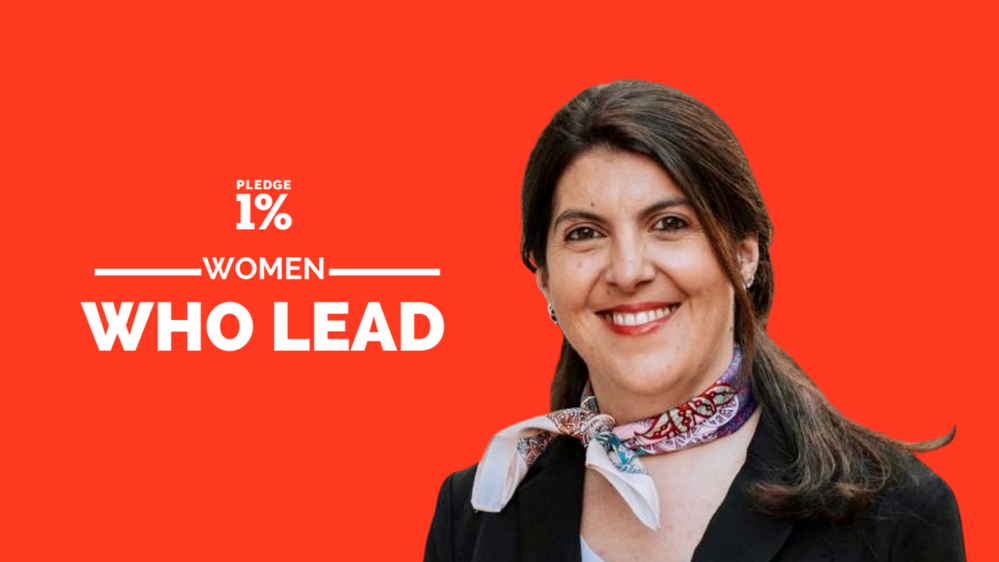
Analía Pérez
Salesforce Consultant, Certa Global Corp.
Durazno, Uruguay
What is your current role? Briefly describe in 1-2 sentences.
I am in the role of functional tester for a project with Vlocity.
What’s the best part of your job? What do you enjoy the most?
Meeting new people, working with people with different cultures and nurturing myself with different experiences.
We’ve all faced personal and professional challenges these past two years – what motivates you to keep going?
Like arrows, when more difficulties pull us back, later we have to move forward. It’s the only way to move on.
What’s the best piece of advice you ever received?
Never give up, the best is yet to come.
What does generosity mean to you?
Help others achieve their goals and stand out. Be available to the other beyond the employment relationship that is generated.
How do you feel businesses can play a larger role in solving today’s biggest challenges? Do you have any specific stories or examples from your work or colleagues you can share?
I think that job reconversion has been a challenge in recent years, and in that sense, Salesforce has collaborated to position and help women grow in this field. In my particular case, it opened the doors to a new world, full of growth and many opportunities, by mixing the experiences of previous studies with the opportunities offered by telecommuting and particularly the Salesforce industry. This has helped me maintain a better balance in my personal and work life.
If you could describe yourself in one word what would that be and why?
Funny, because I think life is better with a smile on.
If you could pick a song to guide you through 2022, which song would it be?
What are you looking forward to this year? Are there any goals (personal or professional), activities, or experiences you are excited about?
Just keep growing